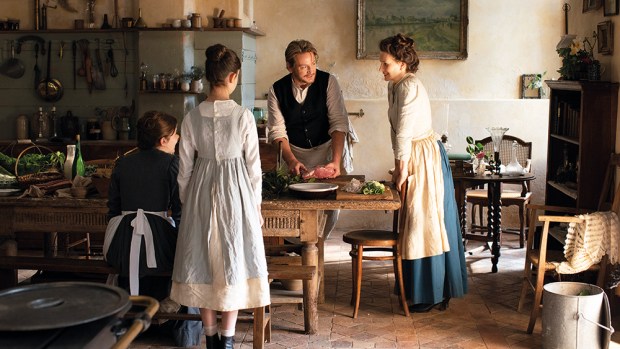99 Homes is an American drama about house repossession. Bummer, you might think, but here is what you don’t yet know: films about house repossessions can be electrifying. Or at least this one is. Set in 2008 or thereabouts, against the backdrop of the real-estate bust and ensuing foreclosure crisis, this has much to say about a system that allows the rich to get richer while the poor get shat on (basically), but, above and beyond that, it is also nail-bitingly tense, as gripping as any thriller, and it will totally tear your heart out. In terms of impact, it may even be the Cathy Come Home of our times.
Directed and co-written by Ramin Bahrani (Man Push Cart, Goodbye Solo), it stars Andrew Garfield and Michael Shannon, who are otherwise Spiderman and General Zod, but not today, as they have better things to do. Today, Garfield is Dennis Nash, a construction worker who lives in suburban Orlando, in the house he grew up in. It’s not the world’s greatest house — it is modest; there are spider plants — but it’s always been home. He lives with his own young son and also his widowed mother (Laura Dern) but times are tough, and he’s fallen behind with payments to the bank. The court is telling him one thing and two different departments at the bank are saying something else when Rick Carver (Shannon), a white-suited real-estate broker who specialises in foreclosures, arrives at his door to evict him.
Disbelief and bewilderment quickly turn to anger. ‘Get off my property, you’re trespassing,’ he tells Carver and the sheriff who, by law, has to accompany him. ‘No, sir,’ says the sheriff. ‘This property now belongs to the bank. It is you who are trespassing, sir.’ (The faux-politeness is strangely terrifying.) Within moments, everything Nash and his family have ever owned has been removed from the house and thrown on to the front lawn. This scene is not a protracted one, just as no scene in this film is a protracted one — everything happens super fast — but if it doesn’t tear your heart out, you may need to ask yourself: is my heart cemented in?
Nash moves his family to a single room in a motel — a motel choked with families in the same situation — but then has reason to see Carver again. This is when it gets properly interesting. Carver, who has become spectacularly rich through selling repossessed properties to investors, offers Nash a job, initially as a handyman. Nash is desperate for money, so accepts. Nash is speedily promoted, and becomes more and more seduced by Carver’s glamorous lifestyle. Soon, he is evicting others in just the same way he himself was evicted. Soon, he is turning confused old men on to the street. No one’s individual predicament matters, he quickly learns. ‘Don’t get emotional about real estate,’ Carver tells him. ‘They’re boxes. Big boxes, small boxes. What’s important is how many boxes you have.’ Nash doesn’t like what he’s doing, but what’s the alternative? And if you do something immoral for moral reasons (i.e., to save your family) where does that leave you? For the audience, though, the overriding question is: will Nash find his way back?
The story is, in fact, an archetypal story, as it’s essentially the full Faustian deal, with Carver as corruptor and Nash as corruptee, but it is also more than this. Might the real devil, the film asks, be the system that begat Carver, rather than Carver himself? The legal loopholes that allow Carver to scam respectable householders are detailed, as is the way the system is rigged. People are being diddled out of their own homes, this is saying, while a certain type of crook can make huge profits without ever having to face jail, and now the world belongs to them. ‘Is it worth it?’ Nash asks Carver, who has to carry a gun everywhere, and can’t go out to dinner without looking over his shoulder. ‘As opposed to what?’ replies Carver. ‘You worked hard all your life and you got me knocking at your door.’
This is played like a thriller, with thriller-style music — a pounding, anxiety-inducing electro beat that is perhaps laid on a little too thick — and it culminates in a thriller-style finale. But what sets you on edge as much as anything is the Carver/Nash relationship — which way is this going to go? —as fleshed out by Shannon and Garfield, who are both riveting. Shannon’s daunting stares put him up there with Christopher Walken, and his Carver wholly convinces as the pitiless, dehumanised master of dehumanising games, while Garfield, who can convey internal anguish and despair without seeming to do anything, will tear your heart out. So, a Cathy Come Home for our times. And, possibly, about time, too.
Got something to add? Join the discussion and comment below.
Get 10 issues for just $10
Subscribe to The Spectator Australia today for the next 10 magazine issues, plus full online access, for just $10.
You might disagree with half of it, but you’ll enjoy reading all of it. Try your first month for free, then just $2 a week for the remainder of your first year.














Comments
Don't miss out
Join the conversation with other Spectator Australia readers. Subscribe to leave a comment.
SUBSCRIBEAlready a subscriber? Log in